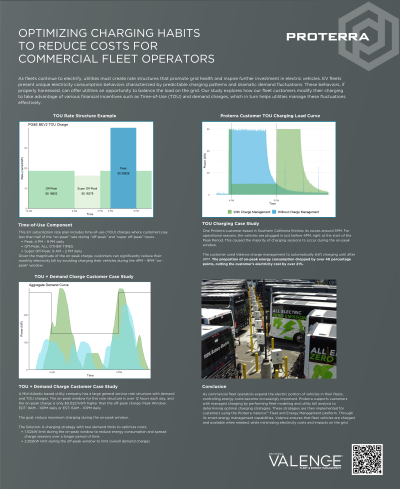Back

Electrification
The Electrification Journey of Commercial Fleet Operators
Tuesday, September 12, 2023
4:30 PM - 5:30 PM PDT
Location: Poster Area, Booth #11024, Level 1, Venetian Expo Hall

- SB
Stina Brock, n/a
VP of Business Development
Proterra
Jackson, Wyoming, United States
Poster Presenter(s)
Description and Background: Utilities around the country are struggling to balance operations that will support state decarbonization goals, which encourage the uptake of electric vehicles, while also maintaining a grid that is cost effective and reliable. Medium and heavy-duty commercial fleets are rapidly electrifying and require DC fast charging to ensure their vehicles can meet the performance needs of industries such as heavy-duty trucking, delivery, public transit, and school transportation. DC fast chargers with multiple dispensers can draw many MWs of power when charging fleets, quickly creating the power demand equivalent to many new skyscrapers popping up all over the grid.
In this presentation, we will provide an overview of the commercial and industrial fleet customer journey as they move to electrify their fleets and we will share insights for utilities that are designing structures and programs to encourage managed charging. Customers that are early on in their fleet electrification journey operate charging much differently than those who have electrified a significant portion of their fleet. This transition is happening more quickly now, and current utility approaches, such as "demand charge holidays" might not set customers up for success in the near future. With the right strategies in place, utilities can help customers charge in a way that not only ensures successful performance of their electric fleets as they transition to fully electric, but also benefits the grid.
We will look at real world customer data and dive into case studies that examine the approaches that different customers take to charging operations. We will describe best practices that Proterra shares with customers and how tools, specifically software, can help customers successfully participate in utility programs so that charging can be managed in a way that benefits all.
In this presentation, we will provide an overview of the commercial and industrial fleet customer journey as they move to electrify their fleets and we will share insights for utilities that are designing structures and programs to encourage managed charging. Customers that are early on in their fleet electrification journey operate charging much differently than those who have electrified a significant portion of their fleet. This transition is happening more quickly now, and current utility approaches, such as "demand charge holidays" might not set customers up for success in the near future. With the right strategies in place, utilities can help customers charge in a way that not only ensures successful performance of their electric fleets as they transition to fully electric, but also benefits the grid.
We will look at real world customer data and dive into case studies that examine the approaches that different customers take to charging operations. We will describe best practices that Proterra shares with customers and how tools, specifically software, can help customers successfully participate in utility programs so that charging can be managed in a way that benefits all.
